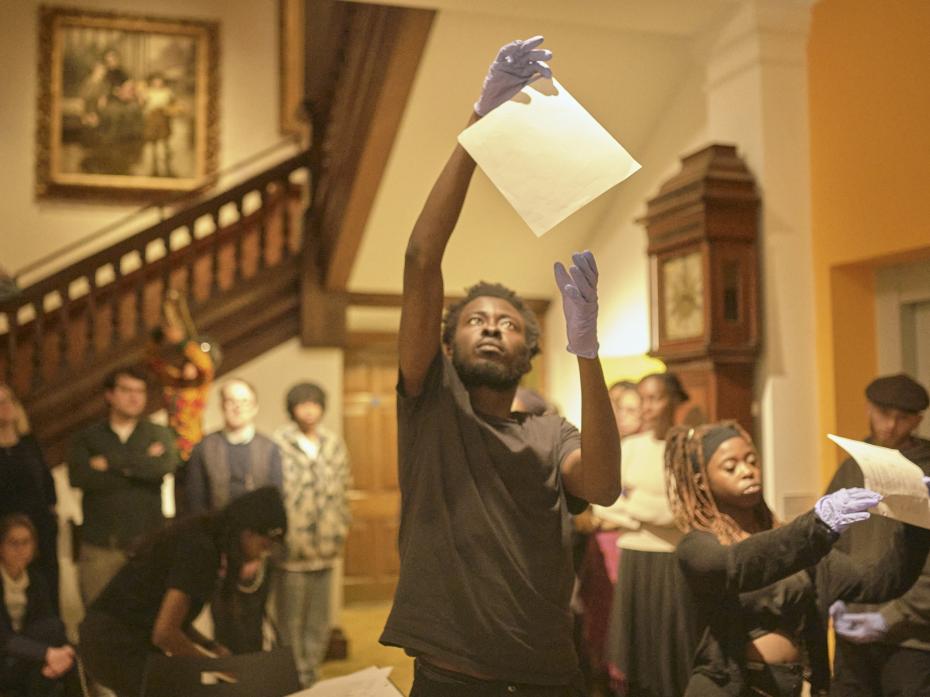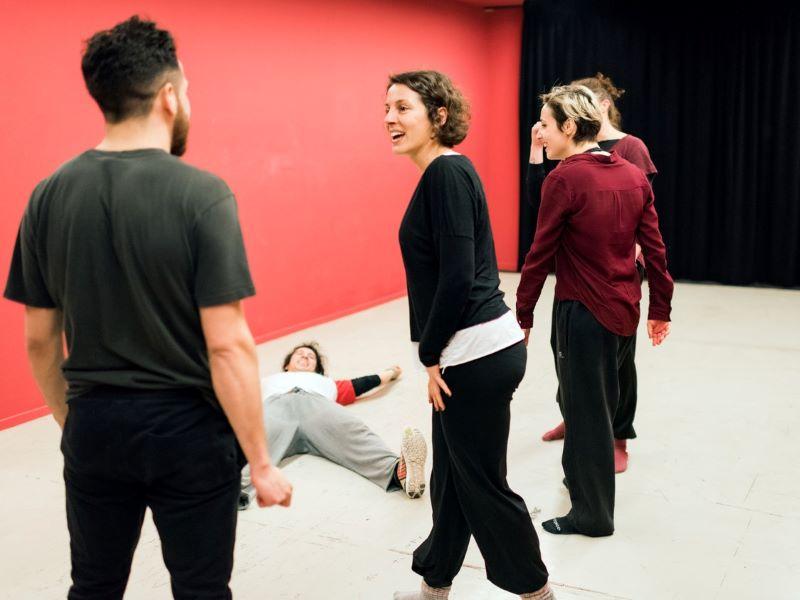
The Verbatim Formula: using creative arts for collaborative research

More and more research claims to be participatory. But what does this mean in practice? Does it genuinely embed participants in the research process? How can we work well with participants so that lived experience drives the research agenda?
Here, we offer reflections on moving from the use of lived experience in research to a process of co-designing research through arts methodologies.
Our research, The Verbatim Formula (TVF), uses creative practices to work with young people who have experience of the care system to explore the questions that matter to them.
This is done by adapting techniques from “headphone performance”, where recorded extracts from interviews are performed word-for-word in theatres. In TVF, our co-researchers decide which parts of their experiences of care are important to share and why.
Across disciplines, there are growing calls to place lived experience at the centre of research about or with groups and communities. This is especially prevalent in public health research, where insights derived from lived experience broaden and contextualise knowledge revealed through data analysis and translational methods. Although participants’ lives and motivations may not fit into neat academic flow charts, an appreciation of their significance minimises the risk that sharing lived experience for research could feel tokenistic or extractive.
Emotionally charged lived experience data may prompt concerns about exposing and broadcasting trauma. However, research into emotive subjects can reveal often overlooked dimensions of living in and with systems. Safeguarding participants is essential, but processes should not be selected in order to protect professionals at the expense of a fuller understanding of lived experience.
We have navigated such issues by moving towards “co-design”, where academics and participants with lived experience go on a journey to become “co-researchers”.
Here we share insight on how to work creatively together, and the implications of this for research practice and funding.
Arts methodologies
Using creative performance practices like games and play brings collective joy, mutual vulnerability and trust to your working group. Whether it’s “Zombies”, “Splat!” or “Stuck in the Mud”, a quick burst of fun energises the room, and helps to tune us all into everyone present.
For some co-researchers the importance of this willingness to play cannot be overstated. A core element of co-research is maintaining a collaborative environment which is relational. When people have been marginalised or placed in positions where they are suspicious of institutions, authorities or professionals with power, ongoing, enjoyable and respectful relationships are vital. Our ways of working demand hybrid and flexible roles, taking everyone out of their comfort zones. We can say from personal experience that there is nothing that brings so much laughter to the room as seeing the fear in the eyes of academic “elders” of the group before trying to beatbox.
- Spotlight guide: THE Awards 2024: learn from the best in UK and Irish higher education
- Resources exploring creativity in higher education
- Campus podcast: unlocking people power through citizen science
Creative practices lead to the expression of a range of nuanced, complex experiences. Sharing a testimony or script, some artwork or music, can elicit those lived and felt experiences that might be more difficult to articulate in a typical interview. Our role as academic co-researchers is often to offer space, or a stimulus that allows these experiences to emerge. This might be asking the group to make images from care with Plasticine or writing a poem telling us what “I am not…”. From here, we might explore and word our research questions together, making audio testimonies in the process.
Working with specialist movement and sound artists, we have developed sequences that show experiences of being alienated through the maze of meetings and bureaucracy that confronts each care-experienced child.
By blending in other art forms that are selected by individuals in the group, each person gets to choose and comment on which parts of their lived experiences are important. In TVF, it is often the affective experience of being in an alienating care system that our co-researchers have foregrounded. This has helped professionals making decisions on care to understand the impact of their choices on those in the care system.
It is important that we share our work with our co-researchers’ peers and care professionals. The chance to recommend what needs to change, and to be heard by the people who have power to change things, confers status on co-researchers and gives shared impetus, motivation and meaning.
Support for lived experience research
TVF co-researchers live busy lives, many of them dealing with zero-hour contracts, or pressures that affect their mental health and creative capacities. We have knock-backs, where people change their mind or feel unable to participate. Multiple plan Bs, for when people can’t turn up, are necessary. Most importantly, we have to develop a sensitive, realistic appreciation of the worlds of the people we are working with.
Working with partners’ lived experience can involve a need for trauma-informed practices. We often factor in a reflective space adjacent to the research in which co-researchers have a chance to consider their own well-being.
All of this impacts how collaborative research is resourced; it can be more time-consuming and expensive. Any underpinning pastoral support needs to be funded, along with the administrative, production and budgeting work that arts research requires. It is important to make sure our funding applications articulate why these resources are important. When our findings don’t easily map on to the requirements or metrics that measure academic outputs, we have to narrate them accordingly and persuasively. Our artist collaborators and evaluators also need to appreciate the working context.
There are tensions in our practices with what might be expected of us as academics. We have found no linear pathway nor final answer, instead, there is a process. There is open-ended conversation and dialogue, and a willingness to try to change our path in accordance with co-researchers’ needs and suggestions. Some outputs of our research will not be captured in a published paper but expressed as an ongoing exploration. Neither is it always about finding a policy solution, but about working with system users to say what works for them in ways that inform or allow that system to evolve.
Responsibility and reflexivity
Involving co-researchers in our work has been an incremental process. Our long-term commitment to collaborative research means the depth of participation goes beyond the tokenistic or advisory, and that the research has meaning for those involved. Co-researchers’ participation in all stages of research, including funding applications, is essential for this shift. Shared, mutual joy in each other, our working relationships, and our creative practices, as well as a belief that the research is worthwhile, continue to nourish the project. This co-research approach means that research practices change. You have to be prepared for the research to change you too.
And the consequences for the academy? Deeper multi-layered discoveries that disrupt working in extractive and alienating ways with our lived experience research partners. Lived experience research is a complex and long-term affair, but it is rich and fulfilling. It’s time to engage and invest in it properly.
Sylvan Baker is a senior lecturer in community performance applied theatre at the Royal Central School of Speech and Drama and a creative learning and education associate at Queen Mary University of London.
Maggie Inchley is a reader in contemporary theatre and performance and director of schools engagement (drama) at Queen Mary University of London.
The Royal Central School of Speech and Drama, in collaboration with Queen Mary University of London, was shortlisted for Knowledge Exchange/Transfer Initiative of the Year at the Times Higher Education Awards 2024 #THEAwards. A full list of shortlisted candidates can be found here.
If you would like advice and insight from academics and university staff delivered direct to your inbox each week, sign up for the Campus newsletter.


